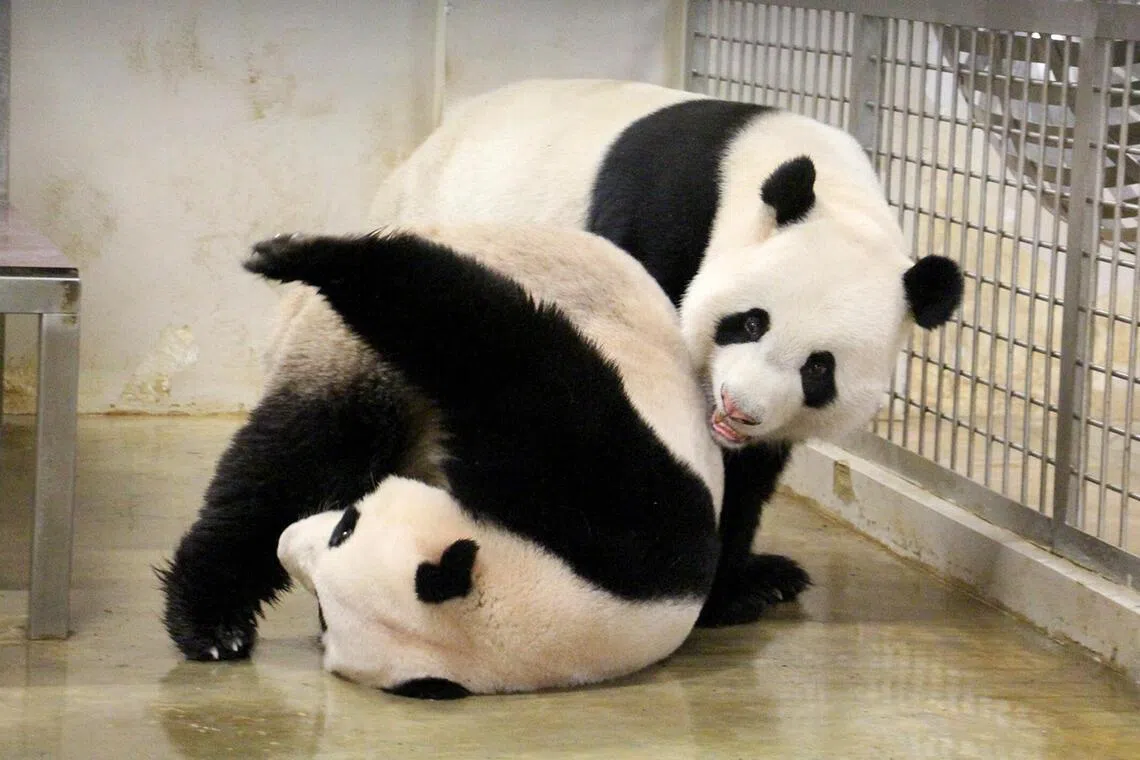No baby news: Giant panda Jia Jia not pregnant after natural mating, artificial insemination
Sign up now: Get ST's newsletters delivered to your inbox

Kai Kai (on top) frolicking with Jia Jia. Mandai Wildlife Group's animal care and veterinary teams were kept in suspense as Jia Jia had exhibited several signs associated with pregnancy.
PHOTO: MANDAI WILDLIFE GROUP
Follow topic:
SINGAPORE – Panda lovers hoping for Singapore-born giant panda Le Le to have a sibling in 2025 will have to wait a little longer.
In response to queries from The Straits Times, Mandai Wildlife Group on Nov 18 said that Le Le’s mum, Jia Jia, is not pregnant.
The announcement came amid much anticipation following the April 21-22 closure
The move to close the popular exhibit to the public was to better support beloved giant pandas Jia Jia and Kai Kai during their mating season.
Mandai Wildlife Group said that its animal care and veterinary teams had supported both pandas with their natural mating, and a carefully timed artificial insemination on April 25.
The artificial insemination procedure was carried out using best-practice protocols and in consultation with panda breeding experts from China, said Mandai Wildlife Group’s Dr Heng Yirui, deputy vice-president of the Veterinary Healthcare and Scientific Programmes.
“The teams carefully monitored behavioural signs, hormone levels and ovulation timing to optimise the chances,” he said.
They were kept in suspense as Jia Jia had exhibited several signs associated with pregnancy, including hormonal shifts, behavioural changes and a reduced appetite, according to the statement.
By late October, however, it became clear that Jia Jia had gone through a pseudopregnancy – a common phenomenon in giant pandas, Dr Heng said.
He added that although this is not the outcome the team had hoped for, it reflects the natural challenges of working with a species whose reproductive biology is delicate and complex.
“Even when all the conditions appear ideal, nature has its own plans, which is why each panda birth is so special.”
Giant panda females like Jia Jia ovulate only once a year, and have a very short fertile window, often just under 48 hours.
“Each breeding season is an opportunity to deepen our understanding and contribute to the collective knowledge shared among partners committed to protecting the giant pandas, both in managed care and in their wild habitats,” Dr Heng said.
“We know how much our community cares for our giant pandas, and we thank everyone for the heartfelt support.”
Both Kai Kai and Jia Jia remain in excellent health and will continue their role as beloved ambassadors for wildlife and conservation, Dr Heng said.
The pandas arrived in Singapore in September 2012, on a decade-long loan from China. In 2022, their stay was extended by five years to 2027.
After six failed attempts to conceive since their arrival, first-time parents Kai Kai and Jia Jia successfully welcomed Le Le on Aug 14, 2021.
Today, the male remains the only giant panda to be born in Singapore. He was returned to China on Jan 16, 2024, after spending about two years at the River Wonders park, where he shared an exhibit with his parents.

Le Le is the firstborn of giant pandas Kai Kai and Jia Jia. His name was revealed by Singapore and China on Dec 29, 2021.
PHOTO: MANDAI WILDLIFE GROUP
This comes under the terms of the original panda loan agreement signed between Mandai Wildlife Group and China Wildlife Conservation Association.
In September, Kai Kai and Jia Jia turned 18 and 17, respectively.
According to the Smithsonian’s National Zoo & Conservation Biology Institute website, giant pandas reach breeding maturity between four and seven years of age and may breed until they are in their 20s.

